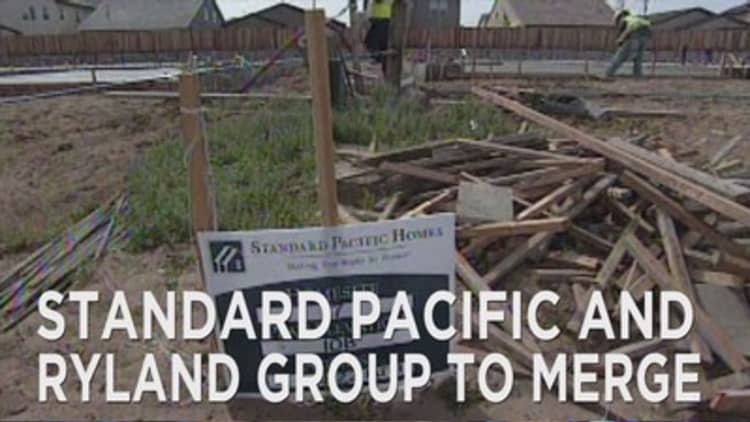
Home builder Ryland announced it would merge with Standard Pacific, creating the fourth largest builder by revenue. The deal is expected to close in the fall.
Standard Pacific will undertake a 1-for-5 reverse stock split. After the split, Ryland shareholders will receive 1.0191 shares of Standard Pacific stock for each Ryland share.
Though billed as a "merger of equals," Ryland will hold a 41-percent stake while Standard Pacific will have a 59-percent stake.
Mergers of home builders are fairly rare events. The last real merger of size in this space was between PulteGroup and Centex in 2009, though in 2013 Tri Pointe Homes acquired the land assets of Weyerhaeuser.
Read More Home builder confidence hits highest level of year, up 5 points
Why are mergers fairly rare in the home building space? Builders don't like to buy each other because what they really want is the land. That's what is scarce. So why pay a premium for operations when all they want is land? Just buy the land.
Still, in some circumstances, the deal would make sense when you need scale fast. You get the purchasing power of a bigger guy. More negotiating power with subcontractors.
It would also make sense if you thought the home building market was in for a period of slow growth.
What does Ryland get out of this deal?
- Diversification: more sales in California. Sales would go from 9 percent of revenues to 27 percent today, with lower exposure to the Midwest and Mid-Atlantic regions.
- More land, the endgame of all builders.
- Higher-end product: more exposure to move-up buyers.
Read More 'Move-up' buyers drive San Diego housing
What does Standard Pacific get? There's a slightly unique situation because MatlinPatterson, the distressed private equity firm that has a big stake in Standard Pacific (it owns 41 percent), may be viewing this as an exit strategy by providing much better liquidity.
Would somebody else step in? This apparently was not a shopped deal. However, that doesn't mean no one else would be interested.
For example, Taylor Morrison gets a significant portion of its revenue from California. I mentioned earlier that Tri Pointe Homes, which is controlled by Barry Sternlicht, bought the Weyerhaeuser land a couple years ago. It gets a significant portion of its revenues from California as well.
The big question is whether this will start another wave of consolidation in home building.
One thing's for sure: There is not much of a premium here. At Friday's closing price of $8.36, with the 1-5 stock split ($41.80), times the premium (1.0191) gives you roughly $42.59, which is almost exactly what Ryland closed at on Friday ($42.79)


